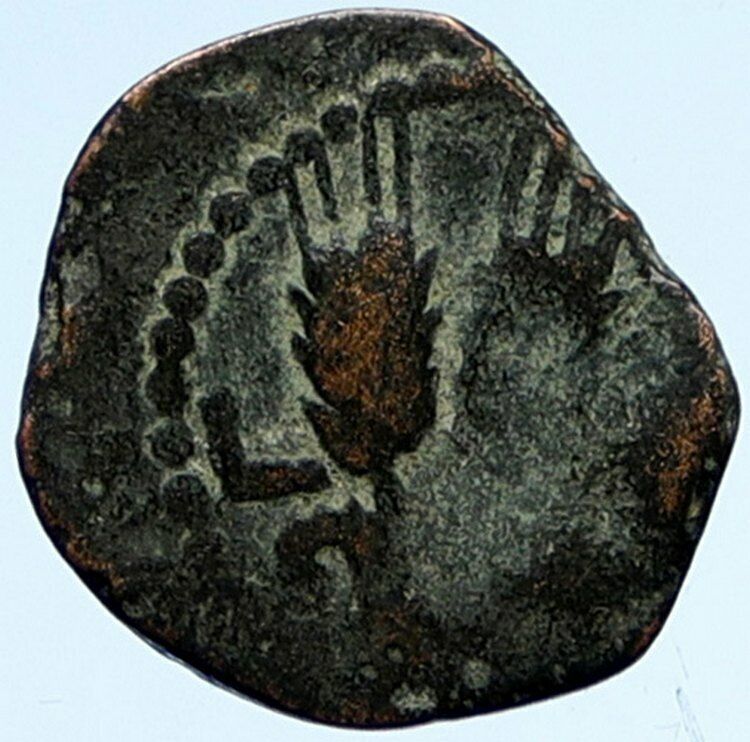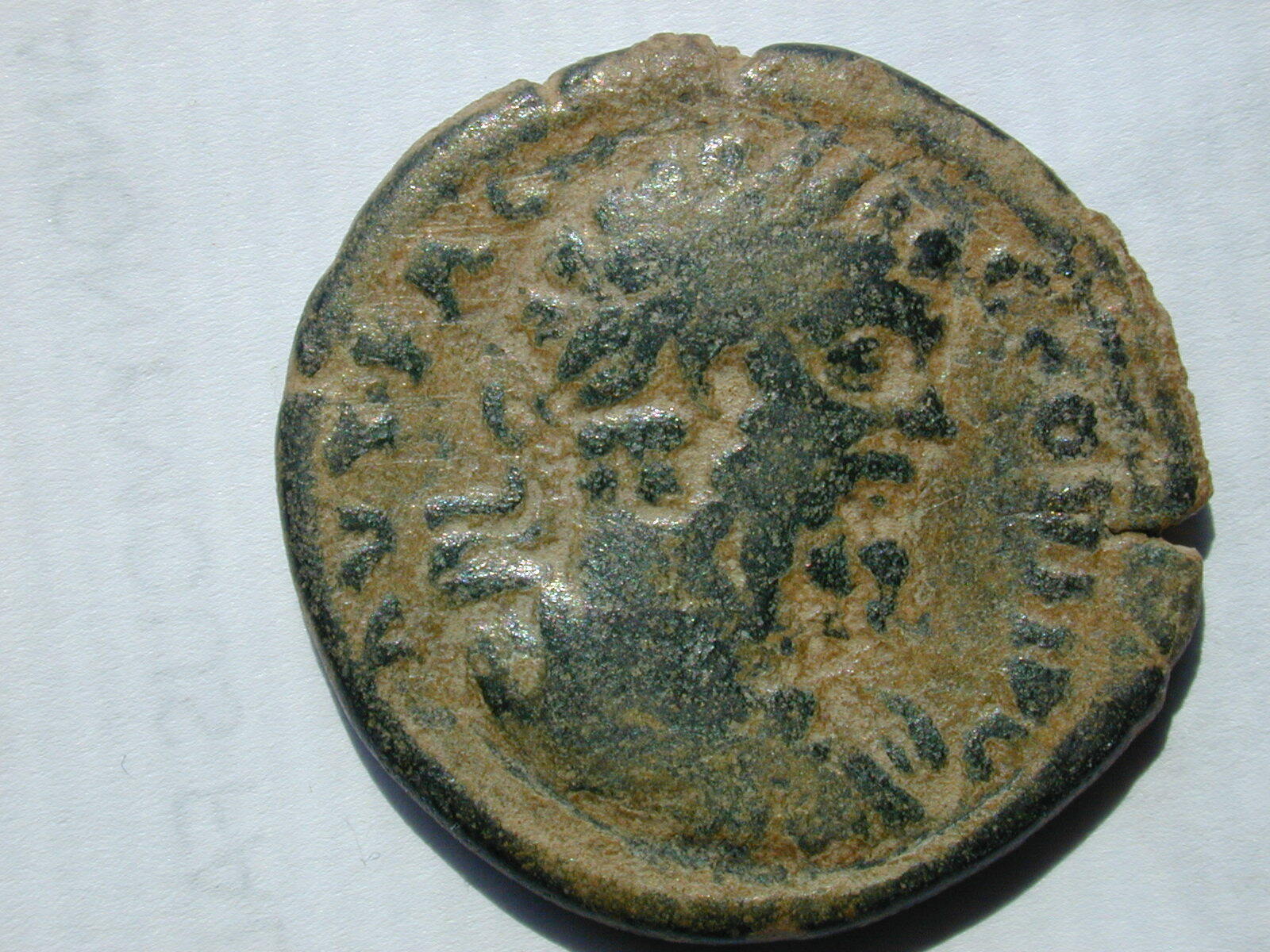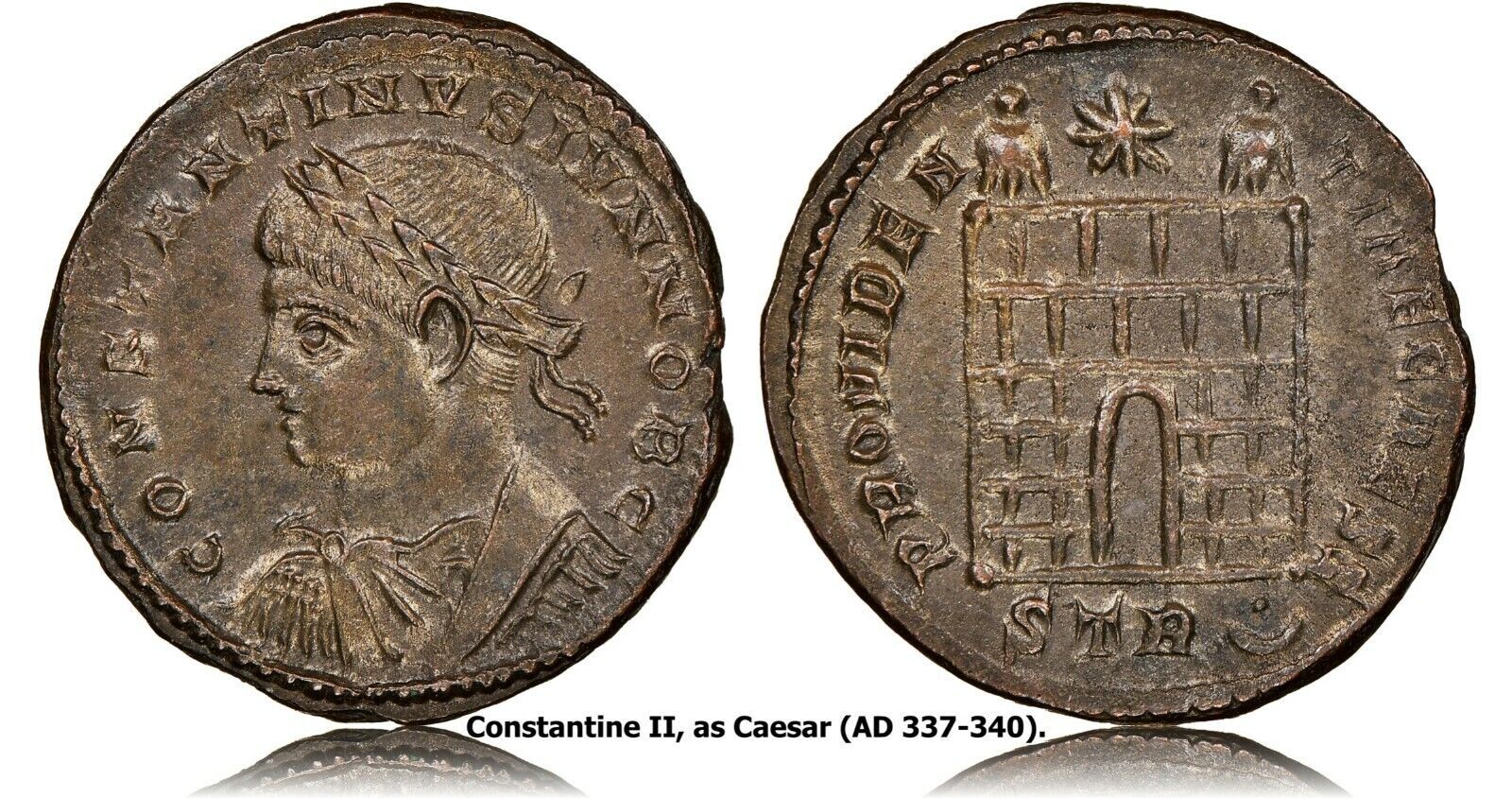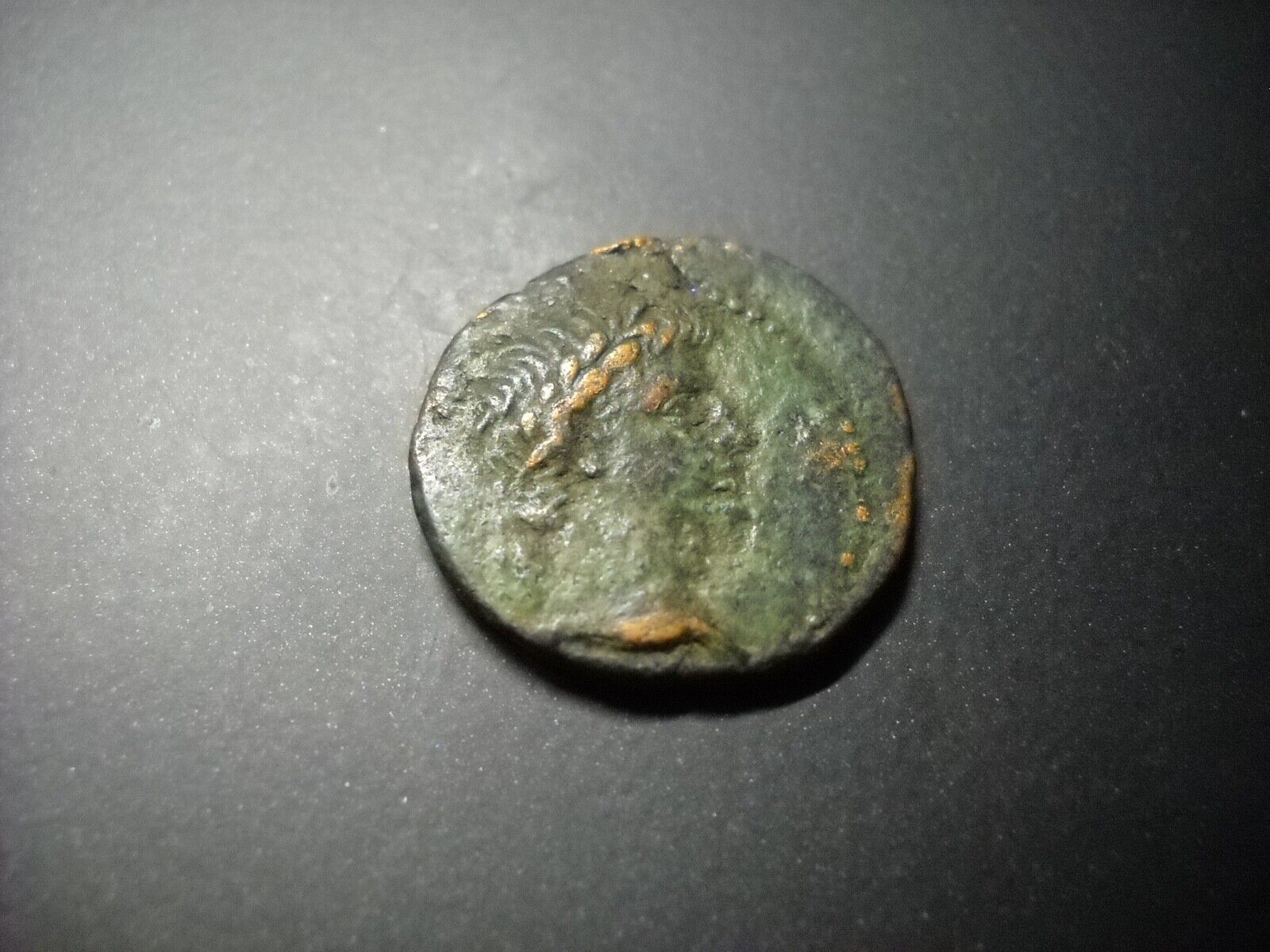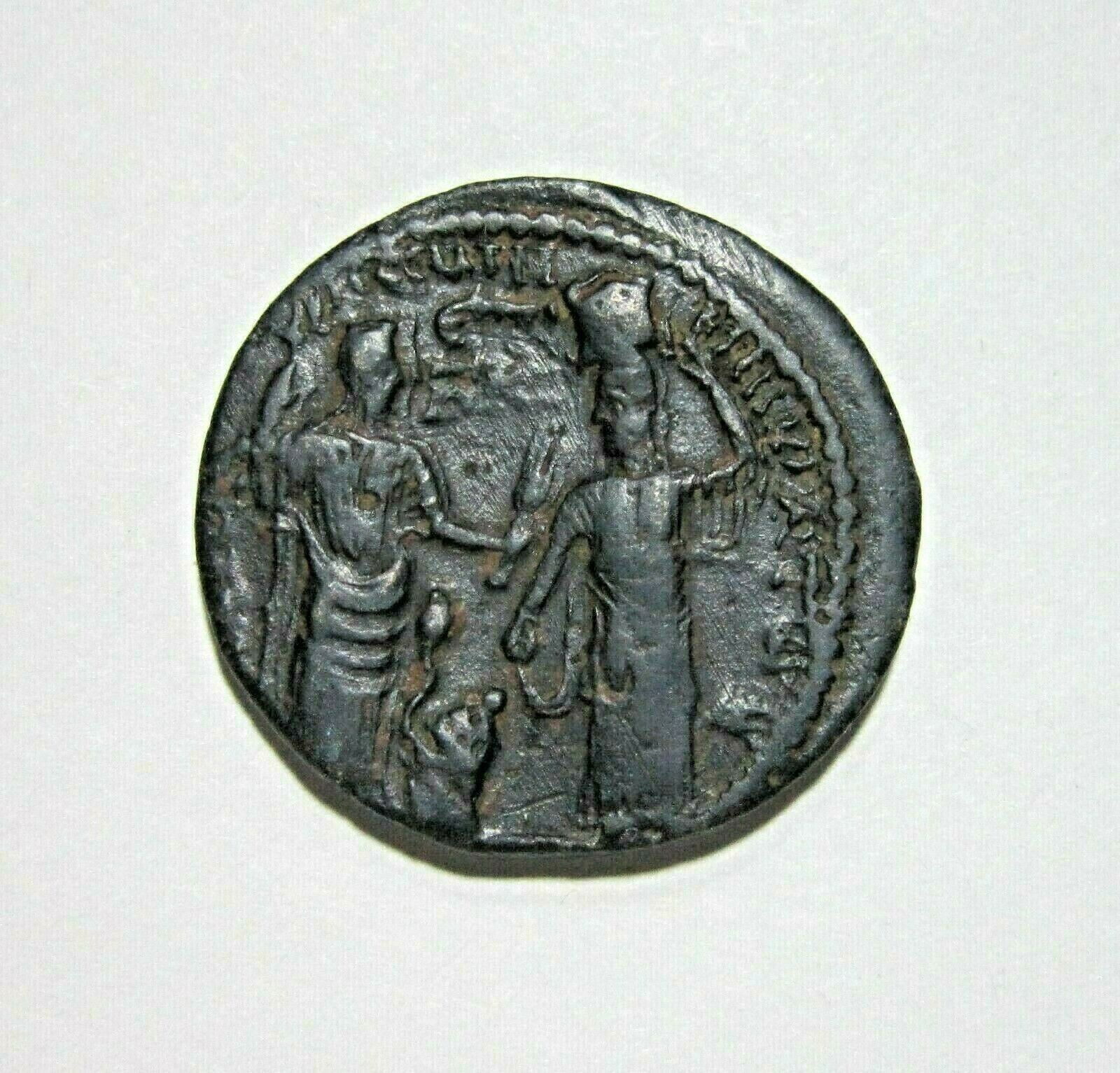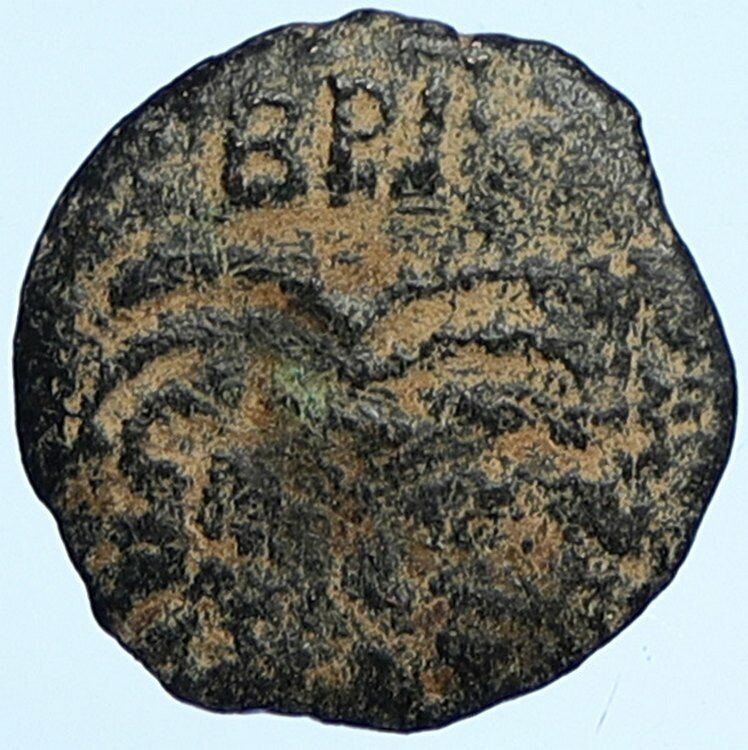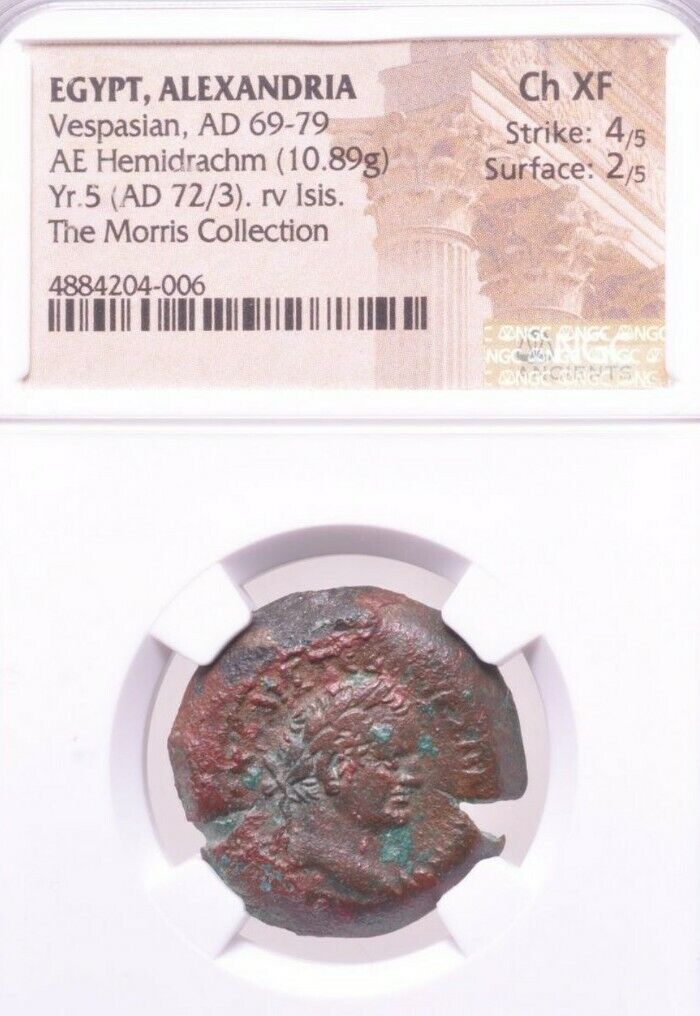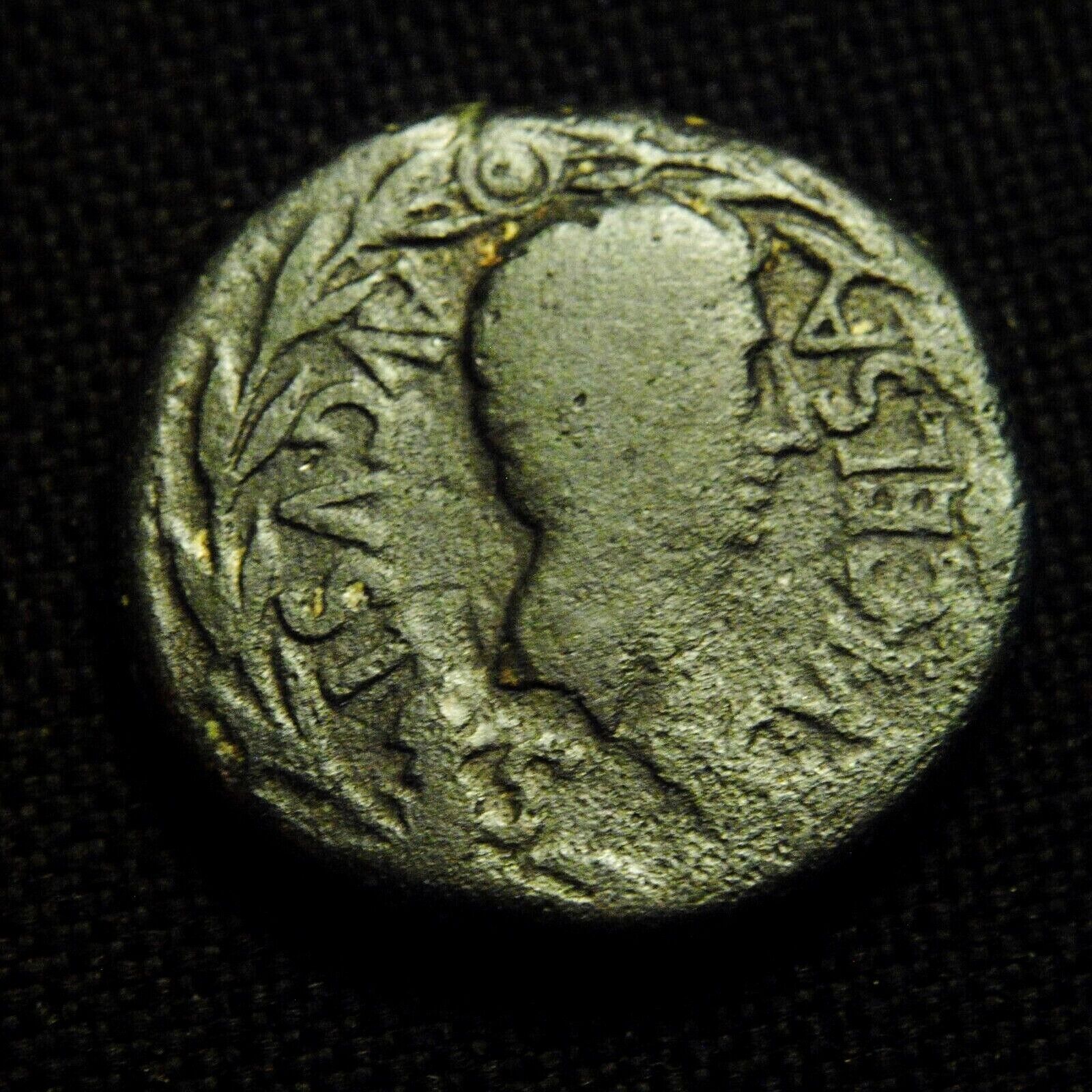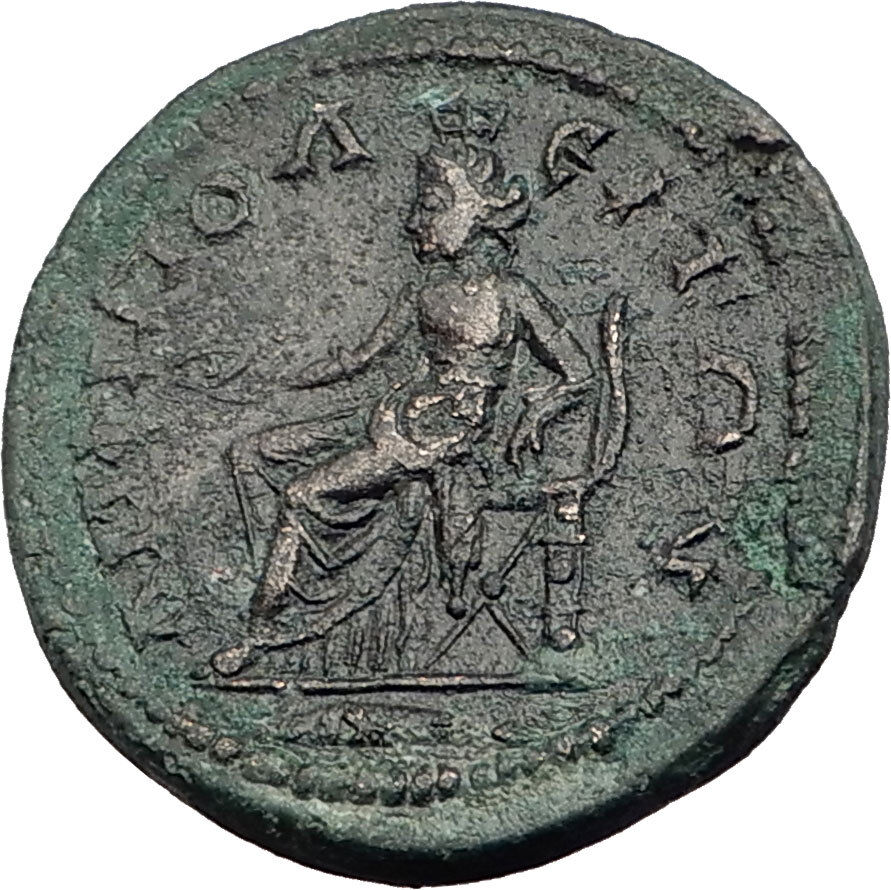-40%
AGRIPPA I JUDAEA under Claudius 41AD Ancient ANTIQUE Roman PRUTAH Coin i95533
$ 35.27
- Description
- Size Guide
Description
Item:i95533
Authentic Ancient Coin of:
Herod
Agrippa I
- King of Judaea: 37-44 A.D.
Struck under
Claudius
-
Roman Emperor
: 41-54 A.D.
Bronze Prutah 16mm (2.98 grams)
Jerusalem
mint,
struck 41/42 A.D.
Reference:
Hendin 1244
(5th edition); Hendin 553 (3rd Edition)
Umbrella-like canopy with fringes, Greek legend, BACIΛEWC AΓPIΠΑ "of King Agrippa" around. (The Umbrella like canopy is attributed as being a symbol of power.)
L ϛ (year 6) flanking three ears of barley. (Symbol of fertility of the land.).
Evidence points out that this coin was struck by Agrippa I for areas populated largely by the Jewish people of Judaea. He is referred to in the bible in Acts 12:1-25.
You are bidding on the exact item pictured, provided with a Certificate of Authenticity and Lifetime Guarantee of Authenticity.
Public Domain
Herod Agrippa
, also known as
Herod
or
Agrippa I
(Hebrew: אגריפס) (11 BC - 44 AD), was a King of Judea from 41 to 44 AD. He was the last ruler with the royal title reigning over Judea and the father of Herod Agrippa II, the last King from the Herodian dynasty. The grandson of Herod the Great and son of Aristobulus IV and Berenice, he was born
Marcus Julius Agrippa
, so named in honour of Roman statesman Marcus Vipsanius Agrippa. He is the king named Herod in the Acts of the Apostles 12:1: "Herod (Agrippa)" (Ἡρώδης Ἀγρίππας). Josephus states that he was known in his time as "Agrippa the Great".
Christian and Jewish historiography take different views of this king, with the Christians largely opposing Agrippa and the Jews placing little precedent toward the Judean kings installed by Rome.
Agrippa's territory comprised most of Israel, including Judea, Galilee, Batanaea and Perea. From Galilee his territory extended east to Trachonitis.
Life
Rome
Josephus informs us that, after the murder of his father, young Agrippa was sent by Herod the Great to the imperial court in Rome. There, Tiberius conceived a great affection for him, and had him educated alongside his son Drusus, who also befriended him, and future emperor Claudius. On the death of Drusus, Agrippa, who had been recklessly extravagant and was deeply in debt, was obliged to leave Rome, fleeing to the fortress of Malatha in Idumaea. There, it was said, he contemplated suicide.
After a brief seclusion, through the mediation of his wife Cypros and his sister Herodias, Agrippa was given a sum of money by his brother-in-law and uncle, Herodias' husband, Herod Antipas, Tetrarch of Galilee and Perea, and was allowed to take up residence in Tiberias, and received the rank of aedile in that city, with a small yearly income. But having quarrelled with Antipas, he fled to Flaccus, proconsul of Syria. Soon afterwards he was convicted, through the information of his brother Aristobulus, of having received a bribe from the Damascenes, who wished to purchase his influence with the proconsul, and was again compelled to flee. He was arrested as he was about to sail for Italy, for a sum of money which he owed to the treasury of Caesar, but made his escape, and reached Alexandria, where his wife succeeded in procuring a supply of money from Alexander the Alabarch. He then set sail, and landed at Puteoli. He was favorably received by Tiberius, who entrusted him with the education of his grandson Tiberius Gemellus. He also formed an intimacy with Caligula, then a popular favorite. Agrippa was one day overheard by his freedman Eutyches expressing a wish for Tiberius's death and the advancement of Caligula, and for this he was cast into prison.
Caligula and Claudius
Following Tiberius' death and the ascension of Agrippa's friend Caligula in 37, Agrippa was set free and made king of the territories of Gaulanitis, Auranitis, Batanaea, and Trachonitis, which his uncle Philip the Tetrarch had held, with the addition of Abila. Agrippa was also awarded the
ornamenta praetoria
and could use the title
amicus caesaris
("friend of Caesar"). Caligula also presented him with a gold chain equal in weight to the iron one he had worn in prison, which Agrippa dedicated to the Temple of Jerusalem on his return to his ancestral homeland. In 39, Agrippa returned to Rome, and brought about the banishment of his uncle, Herod Antipas; he was then granted his uncle's tetrarchy, consisting of Galilee and Peraea. This created a Jewish kingdom which did not include Judea at its center.
After the assassination of Caligula in 41, Agrippa was involved in the struggle over the accession between Claudius, the Praetorian Guard, and the Senate. How big a part Agrippa played is uncertain; the various sources differ. Cassius Dio simply writes that Agrippa cooperated with Claudius in seeking rule. Flavius Josephus gives us two versions. In
The Jewish War
, Agrippa is presented as only a messenger to a confident and energetic Claudius. But in
The Antiquities of the Jews
, Agrippa's role is central and crucial: he convinces Claudius to stand up to the Senate and the Senate to avoid attacking Claudius. After becoming Emperor, Claudius gave Agrippa dominion over Judea and Samaria and granted him the
ornamenta consularia
, and at his request gave the kingdom of Chalcis in Lebanon to Agrippa's brother Herod of Chalcis. Thus Agrippa became one of the most powerful kings of the east. His domain more or less equaled that which was held by his grandfather Herod the Great.
In the city of Berytus, he built a theatre and amphitheatre, baths, and porticoes. He was equally generous in Sebaste, Heliopolis and Caesarea. Agrippa began the building of the third and outer wall of Jerusalem, but the suspicions he had of Claudius's intervention prevented him from finishing the fortifications which he had begun. His friendship was courted by many of the neighboring kings and rulers, some of whom he housed in Tiberias, which also caused Claudius some displeasure.
Reign and death
Accounts in Josephus
Agrippa returned to Judea and governed it to the satisfaction of the Jews. His zeal, private and public, for Judaism is recorded by Josephus, Philo of Alexandria and the rabbis. Perhaps because of this, his passage through Alexandria in the year 38 instigated anti-Jewish riots. At the risk of his own life, or at least of his liberty, he interceded with Caligula on behalf of the Jews, when that emperor was attempting to set up his statue in the Temple at Jerusalem shortly before his death in 41. Agrippa's efforts bore fruit and persuaded Caligula to rescind his order thus preventing the Temple's desecration. However, Philo of Alexandria recounts that Caligula issued a second order to have his statue erected in the Temple. Another statue of himself, of colossal size, was built of gilt brass. The Temple of Jerusalem was then transformed into a temple for Caligula, and it was called the Temple of illustrious Gaius the new Jupiter.
After Passover in 44, Agrippa went to Caesarea, where he had games performed in honor of Claudius. In the midst of his speech to the public a cry went out, and Agrippa did not publicly react. At this time he saw an owl perched over his head. During his imprisonment by Tiberius a similar omen had been interpreted as portending his speedy release and future kingship, with the warning that should he behold the same sight again, he would die. He was immediately smitten with violent pains, scolded his friends for flattering him and accepted his imminent death. He experienced heart pains and a pain in his abdomen, and died after five days. (Herod Agrippa's views in regard to omens is not acceptable according to Rabbinical Judaism.) Josephus then relates how Agrippa's brother, Herod of Chalcis, and Helcias sent Aristo to kill Silas.
From Josephus, Antiquities 19.8.2 343-361: "Now when Agrippa had reigned three years over all Judea he came to the city Caesarea, which was formerly called Strato's Tower; and there he exhibited spectacles in honor of Caesar, for whose well-being he'd been informed that a certain festival was being celebrated. At this festival a great number were gathered together of the principal persons of dignity of his province. On the second day of the spectacles he put on a garment made wholly of silver, of a truly wonderful texture, and came into the theater early in the morning. There the silver of his garment, being illuminated by the fresh reflection of the sun's rays, shone out in a wonderful manner, and was so resplendent as to spread awe over those that looked intently upon him. Presently his flatterers cried out, one from one place, and another from another, (though not for his good) that he was a god; and they added, "Be thou merciful to us; for although we have hitherto reverenced thee only as a man, yet shall we henceforth own thee as superior to mortal nature." Upon this the king neither rebuked them nor rejected their impious flattery. But he shortly afterward looked up and saw an owl sitting on a certain rope over his head, and immediately understood that this bird was the messenger of ill tidings, just as it had once been the messenger of good tidings to him; and fell into the deepest sorrow. A severe pain arose in his belly, striking with a most violent intensity. He therefore looked upon his friends, and said, "I, whom you call a god, am commanded presently to depart this life; while Providence thus reproves the lying words you just now said to me; and I, who was by you called immortal, am immediately to be hurried away by death. But I am bound to accept what Providence allots, as it pleases God; for we have by no means lived ill, but in a splendid and happy manner." When he had said this, his pain became violent. Accordingly he was carried into the palace, and the rumor went abroad everywhere that he would certainly die soon. The multitude sat in sackcloth, men, women and children, after the law of their country, and besought God for the king's recovery. All places were also full of mourning and lamentation. Now the king rested in a high chamber, and as he saw them below lying prostrate on the ground he could not keep himself from weeping. And when he had been quite worn out by the pain in his belly for five days, he departed this life, being in the fifty-fourth year of his age and in the seventh year of his reign. He ruled four years under Caius Caesar, three of them were over Philip's tetrarchy only, and on the fourth that of Herod was added to it; and he reigned, besides those, three years under Claudius Caesar, during which time he had Judea added to his lands, as well as Samaria and Cesarea. The revenues that he received out of them were very great, no less than twelve millions of drachmae. But he borrowed great sums from others, for he was so very liberal that his expenses exceeded his incomes, and his generosity was boundless."
Acts 12 relates that he was eaten by worms, after God struck him for accepting the praise of sycophants, comparing him to a god.
The Jewish Encyclopedia has a different account of Agrippa's reign:
Claudius, showed himself grateful to Agrippa for important services rendered him, and upon his accession, placed under his rule the remainder of Palestine, the territories of Samaria, Judea, and Idumæa, formerly governed by Archelaus. Loaded with honors and titles, Agrippa returned home, and the few remaining years of his benevolent sway afforded the people a brief period of peace and prosperity. The evil consequences of a ruler's unbridled passions and tyranny had been sufficiently evident to him in Rome, and they had taught him moderation and strict self-control. His people regarded him with love and devotion, because he healed with tender hand the deep wounds inflicted upon the national susceptibilities by brutal Roman governors. He ruled his subjects with compassion and friendliness. Like the ancestral Asmoneans from whom he sprang through his noble grandmother Mariamne, he honored the Law. Like the merest commoner, he carried his basket of first-fruits to the Temple; with the people he celebrated appropriately the Feast of Tabernacles, and he devoted to the sanctuary a golden chain with which Caligula had honored him. On one occasion, while in the street, he met a bridal procession which drew up to let him pass, but he halted and bade it take precedence. He sought to lighten taxation, remitting the impost on houses in Jerusalem. On the coins minted by him he carefully avoided placing any symbols which could offend the people's religious sentiment. Thus, prosperity and comfort seemed to be dawning anew for the Jews. The Romans, however, became jealous of this rising prosperity, and-sometimes covertly, sometimes openly-laid all manner of obstacles in his way. When he began to repair the fortifications of the capital, he was abruptly bidden to cease. His attempts to fraternize with neighboring peoples-vassals of Rome-were construed as portending rebellion. His sudden death at the games in Cæsarea, 44, must be considered as a stroke of Roman politics. His death, while in the full vigor of his years, was deeply lamented by his people, notwithstanding the fact that he had made many considerable concessions to heathen manners and customs. The Christians looked upon his death as a judgment for his undisguised hostility to their young community (Acts, xii.)."
The Talmud also has a positive view of his reign: The Mishnah explained how the Jews of the Second Temple era interpreted the requirement of Deuteronomy 31:10-13 that the king read the Torah to the people. At the conclusion of the first day of Sukkot immediately after the conclusion of the seventh year in the cycle, they erected a wooden dais in the Temple court, upon which the king sat. The synagogue attendant took a Torah scroll and handed it to the synagogue president, who handed it to the High Priest's deputy, who handed it to the High Priest, who handed it to the king. The king stood and received it, and then read sitting. King Agrippa stood and received it and read standing, and the sages praised him for doing so. When Agrippa reached the commandment of Deuteronomy 17:15 that "you may not put a foreigner over you" as king, his eyes ran with tears, but they said to him, "Don't fear, Agrippa, you are our brother, you are our brother!" The king would read from Deuteronomy 1:1 up through the shema (Deuteronomy 6:4-9), and then Deuteronomy 11:13-21, the portion regarding tithes (Deuteronomy 14:22-29), the portion of the king (Deuteronomy 17:14-20), and the blessings and curses (Deuteronomy 27-28). The king would recite the same blessings as the High Priest, except that the king would substitute a blessing for the festivals instead of one for the forgiveness of sin. (Mishnah Sotah 7:8; Babylonian Talmud Sotah 41a.)
Account in the New Testament
The "King" Herod mentioned in the Acts of the Apostles, chapter 12, is identified as the same person as Herod Agrippa (though the Herod mentioned in Acts 13:1 refers to Herod Antipas). The identification is based in part on the description of his death, which is very similar to Agrippa's death in Josephus's Antiquities of the Jews 19.8.2, although Josephus does not include the claim that "an angel of the Lord struck him down, and he was eaten by worms." Further evidence is the identification of the ruler in Acts 12:1 as "Herod the king," since Agrippa is the only Herod who would have had authority in Jerusalem at that time.
The description of Herod Agrippa as a cruel, heartless king who persecuted the Jerusalem church, having James son of Zebedee killed and imprisoning Peter, stands in contrast with Josephus' account of a kindly man. According to Josephus, he was a milder ruler than his grandfather Herod the Great, and Josephus records him as talking with and then forgiving a law student accused of political rabble rousing, rather than punishing him as his grandfather and some other Herods would have done. Christian scholars argue that the biblical account makes sense given that Agrippa had been raised with a strong Jewish identity. Agrippa would resent a movement begun during his absence from Judæa that tried to declare a man as divine.
Blastus is mentioned in the New Testament as Herod's chamberlain. Herod Antipas, uncle and predecessor of Agrippa as ruler of Galilee and Peræa, is the Herod mentioned in the Gospels who authorized the execution of John the Baptist and played a role in the trial of Jesus. Herod Agrippa II, son of Herod Agrippa, was asked, with his sister Berenice, by the Roman Procurator of Judea, Porcius Festus, to assist in the mini-trial of the Apostle Paul.
Progeny
By his wife Cypros he had a son and three daughters. They were:
Herod Agrippa II [b.27/28 AD?-d.93 AD?] became the eighth and final ruler from the Herodian family.
Berenice [b.28-after 81 AD], who first married Marcus Julius Alexander, son of Alexander the Alabarch around 41 AD. After Marcus Julius died, she married her uncle Herod, king of Chalcis. She later lived with her brother Agrippa II, reputedly in an incestuous relationship. Finally, she married Polamo, king of Cilicia as alluded to by Juvenal. Berenice also had a common-law relationship with the Roman emperor Titus.
Mariamne [b.34-?], who married Gaius Julius Archelaus Antiochus Epiphanes; they had a daughter Berenice (daughter of Mariamne) [b.50 AD] who lived with her mother in Alexandria, Egypt after her parents' divorce
Drusilla [38-79 AD], who married first to Gaius Julius Azizus, King of Emesa and then to Antonius Felix, the procurator of Judaea. Drusilla and her son Marcus Antonius Agrippa died in Pompeii during the eruption of Vesuvius. A daughter, Antonia Clementiana, became a grandmother to a Lucius Anneius Domitius Proculus. Two possible descendants from this marriage are Marcus Antonius Fronto Salvianus (a quaestor) and his son Marcus Antonius Felix Magnus, a high priest in 225.
Frequently Asked Questions
Mr. Ilya Zlobin
, world-renowned expert numismatist, enthusiast, author and dealer in authentic ancient Greek, ancient Roman, ancient Byzantine, world coins & more.
Who am I dealing with?
You are dealing with Ilya Zlobin, ancient coin expert, enthusiast, author and dealer with an online store having a selection of over 15,000 items with great positive feedback from verified buyers and over 10 years experience dealing with over 57,000 ancient and world coins and artifacts. Ilya Zlobin is an independent individual who has a passion for coin collecting, research and understanding the importance of the historical context and significance all coins and objects represent. Most others are only concerned with selling you, Ilya Zlobin is most interested in educating you on the subject, and providing the largest selection, most professional presentation and service for the best long-term value for collectors worldwide creating returning patrons sharing in the passion of ancient and world coin collecting for a lifetime.
How long until my order is shipped?
Orders are shipped by the next business day (after receipt of payment) most of the time.
How will I know when the order was shipped?
After your order has shipped, you will be left positive feedback, and that date could be used as a basis of estimating an arrival date. Any tracking number would be found under your 'Purchase history' tab.
USPS First Class mail takes about 3-5 business days to arrive in the U.S. International shipping times cannot be estimated as they vary from country to country.
Standard international mail to many countries
does not
include a tracking number, and can also be slow sometimes.
For a tracking number and signature confirmation, you may want to do Express Mail International Shipping, which costs more, however, is the fastest and most secure. Additionally you may be able to receive your order in as little as 3-5 business days using this method. For Express Mail International, it may be possible to place up to 10-15 items in one package (for the one shipping cost) as it is flat rate envelope, which may be the most cost-effective, secure and fastest way to receive items internationally. Send me a message about this and I can update your invoice should you want this method.
Getting your order to you, quickly and securely is a top priority and is taken seriously here.
Great care is taken in packaging and mailing every item securely and quickly.
Please be aware, I cannot take responsibility for any postal service delivery delays, especially for international packages as it may happen in rare instances.
What is a certificate of authenticity and what guarantees do you give that the item is authentic?
Each of the items sold here, is provided with a Certificate of Authenticity, and a Lifetime Guarantee of Authenticity, issued by a world-renowned numismatic and antique expert that has identified over 57,000 ancient coins and has provided them with the same guarantee. You will be very happy with what you get with the COA; a professional presentation of the coin, with all of the relevant information and a picture of the coin you saw in the listing. Additionally, the coin is inside it's own protective coin flip (holder), with a 2x2 inch description of the coin matching the individual number on the COA.
On the free-market such a presentation alone, can be considered a - value all in itself, and it comes standard with your purchases from me,
FREE.
With every purchase, you are leveraging my many years of experience to get a more complete context and understanding of the piece of history you are getting. Whether your goal is to collect or give the item as a gift, coins presented like this could be more prized and valued higher than items that were not given such care and attention to.
Buy a coin today and own a piece of history, guaranteed.
Is there a money back guarantee?
I offer a 30 day unconditional money back guarantee. I stand behind my coins and would be willing to exchange your order for either store credit towards other coins, or refund, minus shipping expenses, within 30 days from the receipt of your order. My goal is to have the returning customers for a lifetime, and I am so sure in my coins, their authenticity, numismatic value and beauty, I can offer such a guarantee.
When should I leave feedback?
Once you receive your order, please leave a positive feedback. Please don't leave any negative feedbacks, as it happens sometimes that people rush to leave feedback before letting sufficient time for their order to arrive. Also, if you sent an email, make sure to check for my reply in your messages before claiming that you didn't receive a response. The matter of fact is that any issues can be resolved, as reputation is most important to me. My goal is to provide superior products and quality of service.
How and where do I learn more about collecting ancient coins?
Visit the "
Guide on How to Use My Store
" for on an overview about using my store, with additional information and links to all other parts of my store which may include educational information on topics you are looking for.
